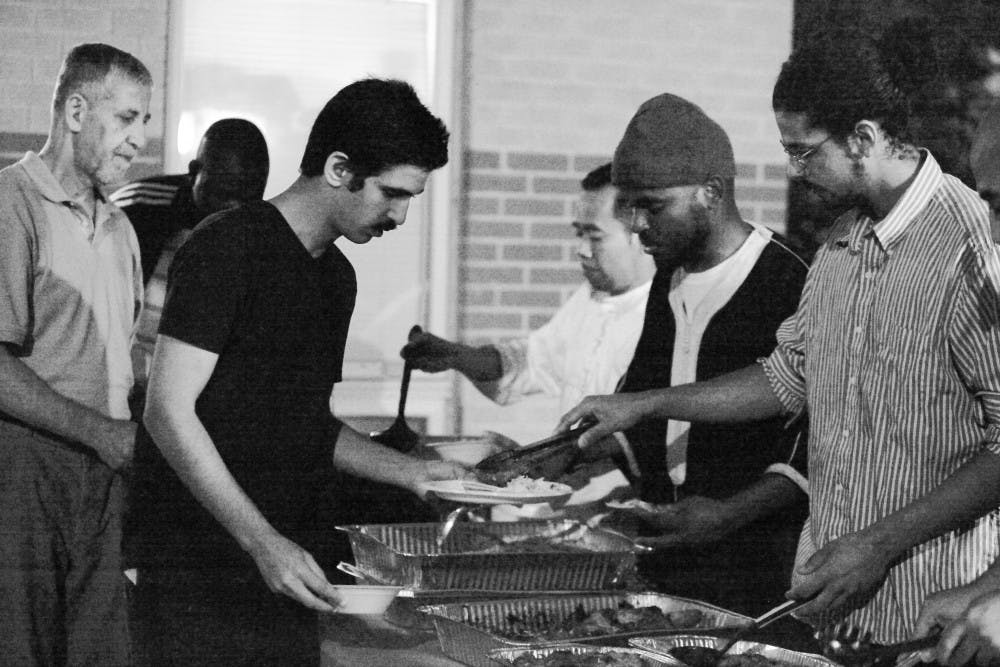Their families came from Somalia, Nigeria, Tanzania, Chad and the Caribbean. They wore different styles of clothing and spoke different languages.
Some of them were loud and giggly, some happily kept to themselves. When the topic of conversation turned to Zayn Malik, the former member of One Direction, several girls gushed over the singer while others said they just didn’t understand what all the hype was about.
The one thing the girls did have in common, the thing bringing them together around the dinner table on a warm summer night, was their faith. They were all Muslims celebrating ?Ramadan.
In Islam, Ramadan is the holy month during which the Muslim holy book, the Quran, was revealed to the prophet Muhammad. To commemorate this, Muslims around the world abstain from eating and drinking during the daylight hours.
“The core activity in Ramadan is fasting,” said Abdul Karim Baram, the chair of the religious outreach committee at the Islamic Center of Bloomington. “There are also other activities besides fasting. Some of it’s educational, some of it’s social.”
The educational aspects of the holy month, which began June 17 this year, include additional readings of the Quran and praying more than the regular five times a day.
“During Ramadan you have a bigger sense of community, and people encourage each other to read more and pray more,” Aisha Masri, a 20-year-old member of the mosque and recent IU graduate, said. “It’s like when you’re going to the gym by yourself and it sucks versus when you have a coach to push you.”
Ramadan is also a time to be charitable. Muslims are encouraged to give to a cause they care about. A group of young women from ICOB are doing 10 good deeds for each of the 10 final days of Ramadan.
Kalsouma Idriss, another young member of the congregation, said fasting helps put their charity into perspective.
“If you go to the store during Ramadan, you want to eat every single thing you see,” she said. “But at the end of the night, you take seven or eight bites and you’re like, ‘Oh my gosh, I’m so full.’ That little amount of food fills you up, so when I’m able to give it to someone else who couldn’t eat all day, I imagine it will fill them up to.”
The celebratory activities begin as soon as the sun sets each ?evening.
More than 100 Muslims gather at the ICOB and break their daylong fast by eating dates and drinking water. After this tiny bit of sustenance, they pray some more.
Then, around 9:30, they fill their plates with delicious food from around the world.
“In most of the Muslim world, the congregations don’t assemble to eat so everybody eats at home,” Baram said. “Because of the low number of Muslims in this community here, everyone feels like they are one family, and they do assemble for eating meals ?together.”
Baram explained diversity is a key principle of Islam. Muslims believe all of humanity was created from one family and they should embrace and help each other. At the ICOB alone, 50 different nationalities are represented.
“When you have people from so many different countries lined up shoulder to shoulder praying, it kind of washes away the arrogance and racism and ethnocentrism that is so present in the world today,” said Hermayat Shahrani, a member of the congregation who is originally from Afghanistan. “Fasting together during Ramadan helps to further strengthen that community.”
Though the Quran does teach the importance of diversity, the type of acceptance found at ICOB cannot always be seen in all Muslim communities.
One young woman remembered the divisions that were created within the Islamic community in the Indiana city where she used to live.
The Africans had their own mosque and the Pakistanis had theirs. More and more divisions were created until there were four separate mosques in the city.
At the ICOB, they don’t differentiate between Sunni or Shia Muslims. Everyone is simply ?Muslim.
This union is necessary, the girls explained as they finished their meal and prepared for the last prayer of the evening, for a group of people who are so widely misrepresented in America.
“Being a part of a religion that is so misunderstood makes you so much more open minded,” Fatima Yusuf Ahmed, a 14-year-old member, said. “People outside the mosque don’t really get it. They don’t understand why we’re being religious when it’s so much easier to not be and just do whatever you want. They don’t understand that it feels so much better to have faith.”






